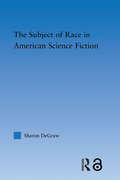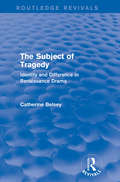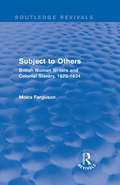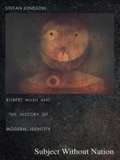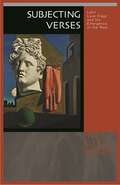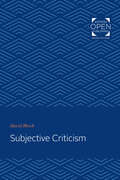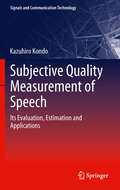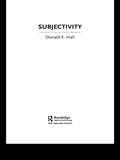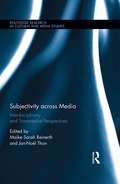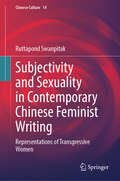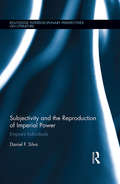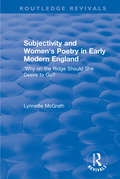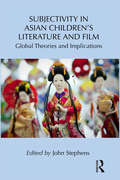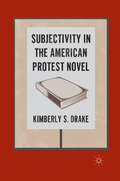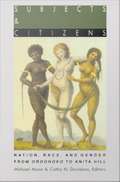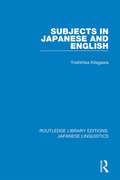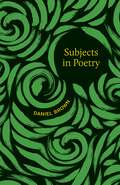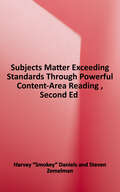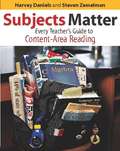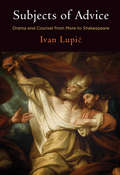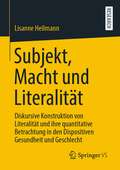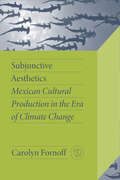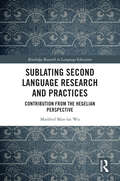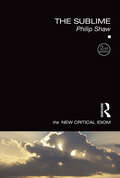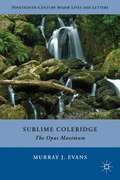- Table View
- List View
The Subject of Race in American Science Fiction (Literary Criticism and Cultural Theory)
by Sharon DeGrawWhile the connections between science fiction and race have largely been neglected by scholars, racial identity is a key element of the subjectivity constructed in American SF. In his Mars series, Edgar Rice Burroughs primarily supported essentialist constructions of racial identity, but also included a few elements of racial egalitarianism. Writing in the 1930s, George S. Schuyler revised Burroughs' normative SF triangle of white author, white audience, and white protagonist and promoted an individualistic, highly variable concept of race instead. While both Burroughs and Schuyler wrote SF focusing on racial identity, the largely separate genres of science fiction and African American literature prevented the similarities between the two authors from being adequately acknowledged and explored. Beginning in the 1960s, Samuel R. Delany more fully joined SF and African American literature. Delany expands on Schuyler's racial constructionist approach to identity, including gender and sexuality in addition to race. Critically intertwining the genres of SF and African American literature allows a critique of the racism in the science fiction and a more accurate and positive portrayal of the scientific connections in the African American literature. Connecting the popular fiction of Burroughs, the controversial career of Schuyler, and the postmodern texts of Delany illuminates a gradual change from a stable, essentialist construction of racial identity at the turn of the century to the variable, social construction of poststructuralist subjectivity today.
The Subject of Tragedy: Identity and Difference in Renaissance Drama (Routledge Revivals)
by Catherine BelseyFirst published in 1985, The Subject of Tragedy takes the drama of the sixteenth and seventeenth centuries as the starting point for an analysis of the differential identities of man and woman. Catherine Belsey charts, in a range of fictional and non-fictional texts, the production in the Renaissance of a meaning for subjectivity that is identifiably modern. The subject of liberal humanism – self-determining, free origin of language, choice and action – is highlighted as the product of a specific period in which man was the subject to which woman was related.
Subject to Others: British Women Writers and Colonial Slavery, 1670-1834 (Routledge Revivals)
by Moira FergusonFirst published in 1992, Subject to Others considers the intersection between late seventeenth- to early nineteenth-century British female writers and the colonial debate surrounding slavery and abolition. Beginning with an overview that sets the discussion in context, Moira Ferguson then chronicles writings by Anglo-Saxon women and one African-Caribbean ex-slave woman, from between 1670 and 1834, on the abolition of the slave trade and the emancipation of slaves. Through studying the writings of around thirty women in total, Ferguson concludes that white British women, as a result of their class position, religious affiliation and evolving conceptions of sexual difference, constructed a colonial discourse about Africans in general and slaves in particular. Crucially, the feminist propensity to align with anti-slavery activism helped to secure the political self-liberation of white British women. A fascinating and detailed text, this volume will be of particular interest to undergraduate students researching colonial British female writers, early feminist discourse, and the anti-slavery debate.
Subject Without Nation: Robert Musil and the History of Modern Identity
by Stefan JonssonThis innovative study of the works of Robert Musil opens a new window on the history of modern identity in western culture. Stefan Jonsson argues that Musil's Austria was the first postimperial state in modern Europe. Prior to its destruction in 1918, the Austro-Hungarian Empire had ruled over a vast array of nationalities and, in the course of its demise as well as after, Austria was beset by nationalism, racism, and other forms of identity politics that ultimately led to the triumph of Nazism. It was to this society that Musil responded in his great work The Man Without Qualities. Exploring the nooks and crannies of this modernist classic, Jonsson shows that Musil's narrative evolves along two axes that must be considered in tandem: Whereas the central plot portrays a Viennese elite that in 1913 attempts to restore social cohesion by gathering popular support for the cultural essence of the empire, the protagonist discovers that he lacks essence altogether and finds himself attracted by monsters, criminals, and revolutionary figures that reject the social order. In this way, Musil's novel traces the disappearance of what Jonsson calls the expressivist paradigm--the conviction that identities such as gender, nationality, class, and social character are expressions of permanent intrinsic dispositions. This, Jonsson argues, is Musil's great legacy. For not only did the Austrian author seek to liquidate prevailing conceptions of personal and cultural identity; he also projected "a new human being," one who would resist assimilation into imperialist, nationalist, or fascist communities. Subject Without Nation presents a new interpretation of Viennese modernity and uncovers the historical foundations of poststructural and postcolonial reconceptualizations of human subjectivity. Illuminating links between Musil's oeuvre as a whole and post-war developments in critical thought, this book locates an important crossroads between literary criticism, intellectual history, and cultural theory.
Subjecting Verses: Latin Love Elegy and the Emergence of the Real
by Paul Allen MillerThe elegy flared into existence, commanded the cultural stage for several decades, then went extinct. This book accounts for the swift rise and sudden decline of a genre whose life span was incredibly brief relative to its impact. Examining every major poet from Catullus to Ovid, Subjecting Verses presents the first comprehensive history of Latin erotic elegy since Georg Luck's. Paul Allen Miller harmoniously weds close readings of the poetry with insights from theoreticians as diverse as Jameson, Foucault, Lacan, and Zizek. In welcome contrast to previous, thematic studies of elegy--efforts that have become bogged down in determining whether particular themes and poets were pro- or anti-Augustan--Miller offers a new, "symptomatic" history. He asks two obvious but rarely posed questions: what historical conditions were necessary to produce elegy, and what provoked its decline? Ultimately, he argues that elegiac poetry arose from a fundamental split in the nature of subjectivity that occurred in the late first century--a split symptomatic of the historical changes taking place at the time. Subjecting Verses is a major interpretive feat whose influence will reach across classics and literary studies. Linking the rise of elegy with changes in how Romans imagined themselves within a rapidly changing society, it offers a new model of literary theory that neither reduces the poems to a reflection of their context nor examines them in a vacuum.
Subjective Criticism
by David BleichOriginally published in 1981. The meaning and objectives of literature, argues David Bleich, are created by the reader, who depends on community consensus to validate his or her judgements. Bleich proposes that the study of English be consciously reoriented from a knowledge-finding to a knowledge-making enterprise. This involves a new explanation of language acquisition in childhood, a psychologically disciplined concept of linguistic and literary response, and a recognition of the intellectual authority of pedagogical communities to originate and establish knowledge. Amplifying his theoretical model with subjective responses drawn from his own classroom experience, Bleich suggests ways in which the study of language and literature can become more fully integrated with each person's responsibility for what he or she knows.
Subjective Quality Measurement of Speech
by Kazuhiro KondoIt is becoming crucial to accurately estimate and monitor speech quality in various ambient environments to guarantee high quality speech communication. This practical hands-on book shows speech intelligibility measurement methods so that the readers can start measuring or estimating speech intelligibility of their own system. The book also introduces subjective and objective speech quality measures, and describes in detail speech intelligibility measurement methods. It introduces a diagnostic rhyme test which uses rhyming word-pairs, and includes: An investigation into the effect of word familiarity on speech intelligibility. Speech intelligibility measurement of localized speech in virtual 3-D acoustic space using the rhyme test. Estimation of speech intelligibility using objective measures, including the ITU standard PESQ measures, and automatic speech recognizers.
Subjectivity (The New Critical Idiom)
by Donald E. HallExplores the history of theories of selfhood, from the Classical era to the present, and demonstrates how those theories can be applied in literary and cultural criticism. Donald E. Hall: * examines all of the major methodologies and theoretical emphases of the twentieth and twenty-first centuries, including psychoanalytic criticism, materialism, feminism and queer theory* applies the theories discussed in detailed readings of literary and cultural texts, from novels and poetry to film and the visual arts* offers a unique perspective on our current obsession with perfecting our selves * looks to the future of selfhood given the new identity possibilities arising out of developing technologies. Examining some of the most exciting issues confronting cultural critics and readers today, Subjectivity is the essential introduction to a fraught but crucial critical term and a challenge to the way we define our selves.
Subjectivity across Media: Interdisciplinary and Transmedial Perspectives (Routledge Research in Cultural and Media Studies)
by Jan-Noël Thon Maike Sarah ReinerthMedia in general and narrative media in particular have the potential to represent not only a variety of both possible and actual worlds but also the perception and consciousness of characters in these worlds. Hence, media can be understood as "qualia machines," as technologies that allow for the production of subjective experiences within the affordances and limitations posed by the conventions of their specific mediality. This edited collection examines the transmedial as well as the medium-specific strategies employed by the verbal representations characteristic for literary texts, the verbal-pictorial representations characteristic for comics, the audiovisual representations characteristic for films, and the interactive representations characteristic for video games. Combining theoretical perspectives from analytic philosophy, cognitive theory, and narratology with approaches from phenomenology, psychosemiotics, and social semiotics, the contributions collected in this volume provide a state-of-the-art map of current research on a wide variety of ways in which subjectivity can be represented across conventionally distinct media.
Subjectivity and Sexuality in Contemporary Chinese Feminist Writing: Representations of Transgressive Women (Chinese Culture #14)
by Ruttapond SwanpitakThis book explores representations of female sexuality and subjectivity in contemporary Chinese fiction by three women writers, published from 1986 to 2000, from the perspective of poststructuralist feminism. It discusses the representative works of authors, Wang Anyi, Tie Ning and Chi Li, who are well known in the Chinese literary field. However, their works have not, to date, been analysed through the poststructuralist feminism’s notions of subjectivity, femininity and transgression. This book, then, provides detailed analysis of each writer and draws comparisons between their works to provide an extended consideration of female sexuality and subjectivity within post-Mao Chinese fiction. In this respect, this book not only offers fresh insights into the three authors’ fiction but also contributes to the feminist study of Chinese women’s writing. Additionally, the research contributes to a better understanding of contemporary Chinese culture in relation to patriarchy, misogyny, feminism, differences and resistance. It is relevant to scholars in the fields of China studies, Chinese literature, feminist literature and gender studies.
Subjectivity and the Reproduction of Imperial Power: Empire’s Individuals (Routledge Interdisciplinary Perspectives on Literature)
by Daniel F. SilvaThis book brings forth a new contribution to the study of imperialism and colonial discourse by theorizing the emergence and function of individual identity as product and producer of imperial power. While recent decades of theoretical reflections on imperialism have yielded important understandings of how the West has repeatedly reconsolidated its power, this book seeks to grasp the complex role of subjectivity in reformulating the terms of imperial domination from early modern European expansion to late capitalism. This entails approaching Empire as a constantly shifting system of differences and meanings as well as an ontological project, a mode of historical writing, and economy of desire that repeatedly envelops the subject into the realm of western power. The analysis of an array of literary texts and cultural artifacts is undertaken by means of a theoretically eclectic approach – drawing on psychoanalysis, post-structuralism, postcolonial theory, and Marxism – with the aim of forwarding current knowledge of Empire while also contributing to different branches of critical theory. In exploring the formation of imperial subjectivity in different historical moments, Silva raises new questions related to the signification of otherness in European expansion and colonial settlement, slavery and eugenics in post-independence Americas, and late capitalist circulation of bodies and commodities. The volume also covers a broad range of geo-cultural spaces in order to locate western power in time and space. This book’s diversity in terms of approach, historical scope, and cultural contexts makes it a useful tool for research and teaching among students and scholars of disciplines including Postcolonial Studies, Colonial History, Literature, and Globalization.
Subjectivity and Women's Poetry in Early Modern England: Why on the Ridge Should She Desire to Go? (Routledge Revivals)
by Lynnette McGrathThis title was first published in 2002: Combining the approaches of historic scholarship and post-structural, feminist psychoanalytic theory to late 16th- and early 17th-century poetry by women, this book aims to make a unique contribution to the field of the study of early modern women's writings. One of the first to concentrate exclusively on early modern women's poetry, the full-length critical study to applies post-Lacanian French psychoanalytic theory to the genre. The strength of this study is that it merges analysis of socio-political constructions affecting early modern women poets writing in England with the psychoanalytic insights, specific to women as subjects, of post-Lacanian theorists Luce Irigaray, Helen Cixous, Julia Kristeva, and Rosi Braidotti.
Subjectivity in Asian Children's Literature and Film: Global Theories and Implications (Children's Literature and Culture)
by John StephensWinner of the Children’s Literature Association Honor Book Award This volume establishes a dialogue between East and West in children’s literature scholarship. In all cultures, children’s literature shows a concern to depict identity and individual development, so that character and theme pivot on questions of agency and the circumstances that frame an individual’s decisions and capacities to make choices and act upon them. Such issues of selfhood fall under the heading subjectivity. Attention to the representation of subjectivity in literature enables us to consider how values are formed and changed, how emotions are cultivated, and how maturation is experienced. Because subjectivities emerge in social contexts, they vary from place to place. This book brings together essays by scholars from several Asian countries — Japan, India, Pakistan, Korea, Vietnam, Taiwan, Australia, Thailand, and The Philippines — to address subjectivities in fiction and film within frameworks that include social change, multiculturalism, post-colonialism, globalization, and glocalization. Few scholars of western children's literature have a ready understanding of what subjectivity entails in children’s literature and film from Asian countries, especially where Buddhist or Confucian thought remains influential. This volume will impact scholarship and pedagogy both within the countries represented and in countries with established traditions in teaching and research, offering a major contribution to the flow of ideas between different academic and educational cultures.
Subjectivity in the American Protest Novel
by Kimberly S. DrakeIn the first major study of the twentieth-century American protest novel, Drake examines a group of authors who self-consciously exploited the revolutionary potential of the novel, transforming literary conventions concerning art and politics, readers and characters.
Subjects and Citizens: Nation, Race, and Gender from Oroonoko to Anita Hill
by Michael Moon Cathy N. DavidsonFocusing on intersecting issues of nation, race, and gender, this volume inaugurates new models for American literary and cultural history. Subjects and Citizens reveals the many ways in which a wide range of canonical and non-canonical writing contends with the most crucial social, political, and literary issues of our past and present. Defining the landscape of the New American literary history, these essays are united by three interrelated concerns: ideas of origin (where does "American literature" begin?), ideas of nation (what does "American literature" mean?), and ideas of race and gender (what does "American literature" include and exclude and how?). Work by writers as diverse as Aphra Behn, James Fenimore Cooper, Edgar Allan Poe, Frances Harper, Harriet Beecher Stowe, Herman Melville, William Faulkner, Harriet Jacobs, Frederick Douglass, Abraham Lincoln, Bharati Mukherjee, Booker T. Washington, Mark Twain, Kate Chopin, Amrico Paredes, and Toni Morrison are discussed from several theoretical perspectives, using a variety of methodologies. Issues of the "frontier" and the "border" as well as those of coloniality and postcoloniality are explored. In each case, these essays emphasize the ideological nature of national identity and, more specifically, the centrality of race and gender to our concept of nationhood. Collected from recent issues of American Literature, with three new essays added, Subjects and Citizens charts the new directions being taken in American literary studies. Contributors. Daniel Cooper Alarcn, Lori Askeland, Stephanie Athey, Nancy Bentley, Lauren Berlant, Michele A. Birnbaum, Kristin Carter-Sanborn, Russ Castronovo, Joan Dayan, Julie Ellison, Sander L. Gilman, Karla F. C. Holloway, Annette Kolodny, Barbara Ladd, Lora Romero, Ramn Saldvar, Maggie Sale, Siobhan Senier, Timothy Sweet, Maurice Wallace, Elizabeth Young
Subjects in Japanese and English (Routledge Library Editions: Japanese Linguistics)
by Yoshihisa KitagawaOriginally published in 1994, this volume shows that the structural relation 'government' holds not only between the verbal head and its object but also between the verbal head and its subject at least at the level of Logical Form in both Japanese and English. The book provides an analysis of complex predicate constructions in Japanese, discusses phrase structure in Japanese and English and develops a theory of binding.
Subjects in Poetry
by Daniel BrownDaniel Brown’s Subjects in Poetry is the first book to examine the broad and imposing topic of poetic subject matter, probing both what poems are about and how that influences the way they're made. It comprises one poet’s attempt to plumb the nature of his art, to ask how the selection of material remains a crucial yet unexplored area of poetic craft, and to suggest the vast range of possible subjects for poems.The book begins by venturing a novel definition of “subject,” derived from Robert Frost’s dictum that poetry constitutes an “art of having something to say.” Brown posits that a poem can say something by expressing, evoking, or addressing. He considers each of these ways-of-saying in turn, first defining it and then looking at poems in which it predominates. Brown next makes a wide-ranging case for the value of subjects to poems, poets, and the art of poetry, especially at a time when many poems appear subjectless. He concludes the book with practical guidance on finding subjects, improving them, and realizing their potential.Replete with thoughtful readings of poems both classic and contemporary, Subjects in Poetry should appeal to poets across all levels and readers interested in understanding the art and practice of poetry.
Subjects Matter: Exceeding Standards Through Powerful Content-Area Reading
by Harvey Smokey" Daniels Steven ZemelmanWe are specialists to the bone-in science, math, social studies, art, music, business, and foreign language. But now, the Common Core and state standards require us to help our students better understand the distinctive texts in our subject areas. "Nobody's making us into reading teachers," write Smokey Daniels and Steve Zemelman, "but we must become teachers of disciplinary thinking through our students' reading." <p><p>If this shift sounds like a tough one, Subjects Matter, Second Edition is your solution. Smokey and Steve, two of America's most popular educators, share exactly what you need to help students read your nonfiction content closely and strategically: <p>•27 proven teaching strategies that help meet-and exceed-the standards <p>•how-to suggestions for engaging kids with content through wide, real-world reading <p>•a lively look at using "boring" textbooks <p>•motivating instruction that's powered by student collaboration <p>•specifics for helping struggling readers succeed. <p><p>Subjects Matter, Second Edition enables deep, thoughtful learning for your students, while keeping the irreverent, inspiring heart that's made the first edition indispensable. You'll discover fresh and re-energized lessons, completely updated research, and vibrant vignettes from new colleagues and old friends who have as much passion for their subjects as you do. <p><p>"We'll be using methods particular to our fields as well as engaging reading materials that help students understand and remember our content better," write Smokey and Steve. "We can realize that vision of the light going on in kids' heads and maybe fill them with enthusiasm about the amazing subject matter that we have to offer. Sound good? Let's get to work."
Subjects Matter: Every Teacher's Guide to Content Area Reading
by Harvey Daniels ; Steven ZemelmanFinally, a book about content-area reading that’s just as useful to math, science, and history teachers as it is to English teachers! Lively, practical, and irreverent, Subjects Matter points the way to activities and materials that energize content and engage students across all subject areas.
Subjects of Advice: Drama and Counsel from More to Shakespeare
by Ivan LupiIn Subjects of Advice, Ivan Lupić uncovers the rich interconnectedness of dramatic art and the culture of counsel in the early modern period. While counsel was an important form of practical knowledge, with concrete political consequences, it was also an ingrained cultural habit, a feature of obligatory mental, moral, and political hygiene. To be a Renaissance subject, Lupić claims, one had to reckon with the advice of others. Lupić examines this reckoning in a variety of sixteenth-century dramatic contexts. The result is an original account of the foundational role that counsel played in the development of Renaissance drama.Lupić begins by considering the figure of Thomas More, whose influential argument about counsel as a form of performance in Utopia set the agenda for the entire century. Resisting linear narratives and recovering, instead, the simultaneity of radically different kinds of dramatic experience, he shows the vitality of later dramatic engagements with More's legacy through an analysis of the moral interlude staged within Sir Thomas More, a play possibly coauthored by Shakespeare. More also helps explain the complex use of counsel in Senecan drama, from the neo-Latin plays of George Buchanan, discussed in connection with Buchanan's political writings, to the historical tragedies of the mid-sixteenth century.If tyranny and exemplarity are the keywords for early Elizabethan drama of counsel, for the plays of Christopher Marlowe it is friendship. Lupić considers Marlowe's interest in friendship and counsel, most notably in Edward II, alongside earlier dramatic treatments, thus exposing the pervasive fantasy of the ideal counselor as another self. Subjects of Advice concludes by placing King Lear in relation to its dramatic sources to demonstrate Shakespeare's deliberate dispersal of counsel throughout his play. Counsel's customary link to plain and fearless speech becomes in Shakespeare's hands a powerful instrument of poetic and dramatic expression.
Subjekt, Macht und Literalität: Diskursive Konstruktion von Literalität und ihre quantitative Betrachtung in den Dispositiven Gesundheit und Geschlecht
by Lisanne Heilmann(Literale) Kompetenzen können – aus einer poststrukturalistischen Perspektive – nicht beobachtet, sondern nur zugeschrieben werden. Diese Zuschreibungen finden in diskursiven Anrufungen statt, in denen Individuen als kompetente oder inkompetente und als hoch oder gering literalisierte Subjekte adressiert und konstruiert werden. Lisanne Heilmann untersucht im vorliegenden Buch diese Zuschreibungen hinsichtlich ihrer komplexen Einbettung in (foucaultsche) Machtverhältnisse und die darin vorgenommenen Anrufungen und Formungen von literalen und literalisierten Subjekten. Aufbauend auf Foucault, Butler und die New Literacy Studies werden hier Literalitätsdiskurse in ihren komplexen Machtstrukturen und ambivalenten Subjektformungen analysiert und die Möglichkeiten quantitativer Forschung vor diesem Hintergrund erörtert. Die Autorin Lisanne Heilmann forscht insbesondere zu Fragen der Konstruktion von Grundkompetenz im Kontext von Geschlecht, Mehrsprachigkeit, Migration und Gesundheit. Sie ist die Koordinator*in des Projektes „Alltagsmathematik als Teil der Grundbildung Erwachsener (Hamburg Numeracy Project)“ und wissenschaftliche Mitarbeiter*in in der Studie „LEO 2018 – Leben mit geringer Literalität“.
Subjunctive Aesthetics: Mexican Cultural Production in the Era of Climate Change (Critical Mexican Studies)
by Carolyn FornoffDuring the twenty-first century, Mexico has escalated extractive concessions at the same time that it has positioned itself as an international leader in the fight against climate change. Cultural production emergent from this contradiction frames this impasse as a crisis of imagination. Subjunctive Aesthetics studies how contemporary writers, filmmakers, and visual artists grapple with the threat that climate change and extractivist policies pose to Mexico's present and future. It explores how artists rise to the challenge of envisioning alternative forms of territoriality (ways of being in relation to the environment) through strategies ranging from rewriting to counterfactual speculation. Whereas ecocritical studies have often focused on art's evidentiary role—its ability to visualize and prove the urgency of environmental damage—author Carolyn Fornoff argues that what unites the artists under consideration is their use of more hypothetical, uncertain representational modes, or "subjunctive aesthetics." In English, the subjunctive is a grammatical mode that articulates the imagined, desired, and possible. In the Spanish language, it is even more widely used to express doubts, denials, value judgments, and emotions. Each chapter of Subjunctive Aesthetics takes up one of these modalities to examine how Mexican artists, writers, and filmmakers activate approaches to the planet not just as it is, but as it could be or should be.
Sublating Second Language Research and Practices: Contribution from the Hegelian Perspective (Routledge Research in Language Education)
by Manfred Man-fat WuWu’s book provides an innovative perspective on, and recommendations for, the major aspects of second language (L2) teaching from a Hegelian anthro-philosophical perspective. Language is social in nature and is related to the larger social milieu. Hegelian philosophy of language complements existing research and theories on L2 learning by not only equipping them with a systematic framework but also broadening their scope. In Hegelian philosophy, language not only has its individual and interpersonal dimensions but is also related to the community, society, and morality. The Hegelian perspective also suggests a number of functions of L2 which have either been neglected or rejected by L2 researchers. This book highlights these neglected elements such as intersubjectivity, mutual recognition, universalization and objectivization of inner subjectivity of individuals, as well as moral enhancement. These concepts generate insights on the teaching and learning of L2. Wu’s volume also covers how the Hegelian anthro-philosophical perspective can help to re-interpret research results on L2 learner characteristics that are related to L2 learning to date such as L2 identity and autonomy. The book offers an alternative research paradigm, teaching philosophy, pedagogical implications, and suggestions for scholars, practitioners, and students in the professional field of L2 teaching.
The Sublime (The New Critical Idiom)
by Philip ShawRelated to ideas of the great, the awe-inspiring and the overpowering, the sublime has been debated for centuries amongst writers, artists, philosophers and theorists and has become a complex yet crucial concept in many disciplines. In this thoroughly updated edition, Philip Shaw looks at: Early modern and post-Romantic conceptions of the sublime in two brand new chapters The legacy of the earliest classical theories, through those of the long eighteenth century to modernist, postmodernist and avant-garde conceptions of the sublime Critical Introductions to major theorists of the sublime such as Longinus, Burke, Kant, Schopenhauer, Nietzsche, Derrida, Lyotard, Lacan and Žižek The significance of the concept through a range of literary readings, including the Old and New Testaments, Homer, Milton and writing from the Romantic period to the present day How the concept of the sublime has affected other art forms such as painting and film, from abstract expressionism to David Lynch’s neo-noir The influence of the sublime on recent debates in the fields of politics, theology and psychoanalysis. Offering historical overviews and explanations, this remarkably clear study is essential reading for students of literature, critical and cultural theory.
Sublime Coleridge
by Murray J. EvansSamuel Taylor Coleridge's Opus Maximum, written in the early 1820s and first published in 2002, is a challenge to every scholar who has encountered it. Sublime Coleridge offers an excellent entry point to this important text of British Romanticism, with an introduction, a reader's guide, and background information. Murray Evans introduces each major theme of the Opus Maximum the Will, divine ideas, human subjectivity, and the Trinity and shows their importance in explaining Coleridge's ideas about religion, psychology, and the sublime. "
